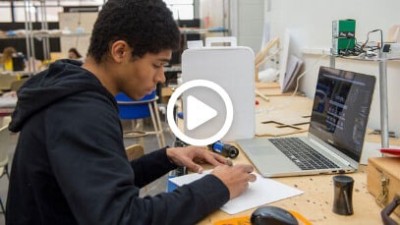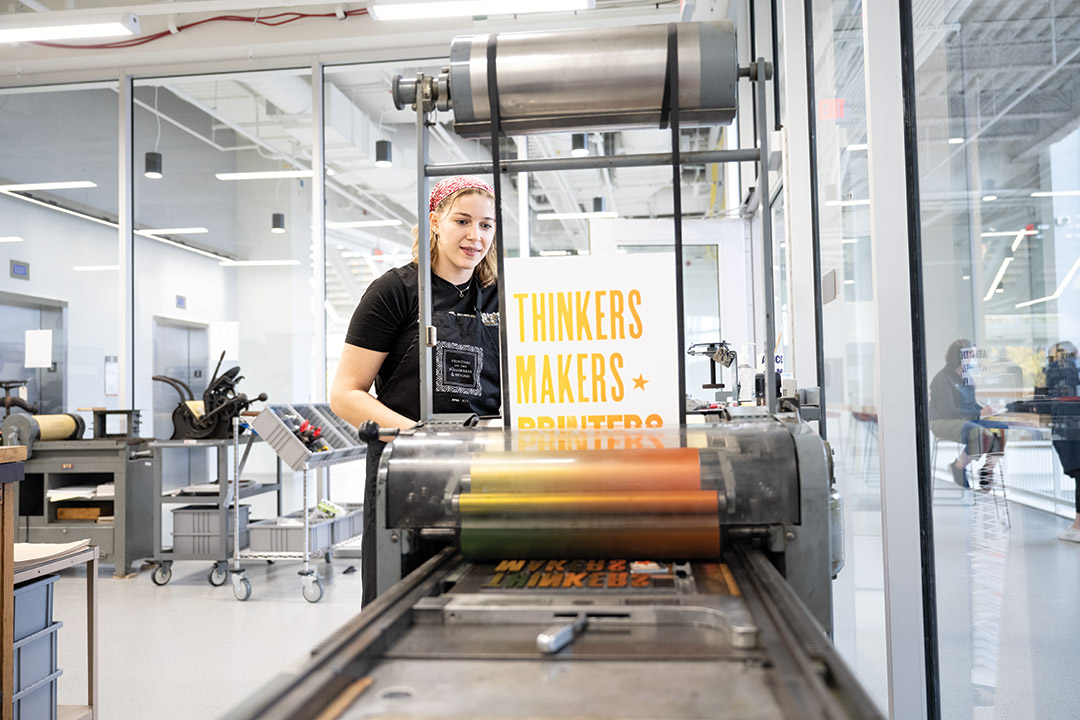Maker community fills the new SHED
Traci Westcott
Fourth-year student Leah Rosen sets type by hand and prints her own designs on vintage presses in the SHED’s Cary Pressroom. She likes to make prints as gifts, such as calendars and cards, for her friends and family
Leah Rosen distributes ink with a palette knife onto the rollers of a 70-year-old press in RIT’s makerspace. She likes setting the type and pulling the handle to press words onto paper. The hands-on process of letterpress printing grounds her in this digital era, she said. It makes her think.
Rosen, a fourth-year student from Rochester, is pursuing a dual degree in industrial design and psychology. She is a lab assistant in the RIT Cary Pressroom in the Student Hall for Exploration and Development (SHED) and spends as much time as she can in the space, even dropping by in between classes to print her own designs or to admire the cases of vintage and storied type.
RIT’s makerspace capacity has grown exponentially from a crowded room on the fourth floor in an engineering building to three floors in the centrally located SHED. New last fall, the SHED complex showcases different kinds of making and learning under one roof—in workshops, performing arts spaces, and extra-large classrooms designed for active learning.
The glass building covers 209,000 gross-square-feet of combined renovated and new construction and fills the space like a city block between the student union and a totally redesigned university library. It is RIT’s largest capital project in 55 years.
The Cary Pressroom where Rosen works is only one of the SHED’s seven makerspaces. Other areas focus on wood and metalworking, 3D printing, laser cutting, electronics, and textiles. Students new to making can learn about the process in the general makerspace.
Rosen’s passion for printing—and getting her hands inky—has enriched her time at RIT with unexpected opportunities and a close mentorship with Amelia Hugill-Fontanel, associate curator at the Cary Graphic Arts Collection in RIT’s Wallace Library.
Rosen helped Hugill-Fontanel organize, clean, repair presses, and set up the Cary Pressroom. She is a teaching assistant in the Letterpress Printmaking class in the College of Art and Design and shows other students how to operate the presses. She wants to share the experience.
“There is such attention to detail and physicality to letterpress—or any hands-on making where there is a part of you in it,” Rosen said. “That’s what drew me to letterpress—it’s a deliberate and careful process. Then, there’s this beautiful intersection between design and this incredible technology that is hundreds of years old and combines with the written word. I am so unbelievably lucky to use this space.”
The SHED is also home to competitive student performance teams that build rockets, robots, electric vehicles, and steel bridges. The Maker Showcase also allows teams and groups that did not relocate to the SHED an opportunity to share what they create with the community.
The SHED’s soaring architecture and the bustle of approximately 15,000 people passing regularly through the building create a new vibe on campus.
“Walking into the SHED is like traveling to RIT in the future,” said Michael Buffalin IV, SHED makerspace director. “You turn a corner on campus and suddenly there’s this huge airy space with gorgeous light and palpable energy. It’s a place where you can express yourself through creative arts, apply critical thinking through making, and work in teams to tackle problems.”
The free-floating synergy is something Hugill-Fontanel hopes students like Rosen harness in the Cary Pressroom.
“We are in a prime space,” Hugill-Fontanel said. “We can merge historic letterpress with 21st-century technologies, and that’s what the students know how to do. They are savvy at using digital design tools, but to output and use it as an analog process, too, is another kind of learning.”








